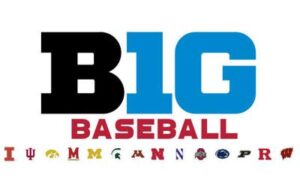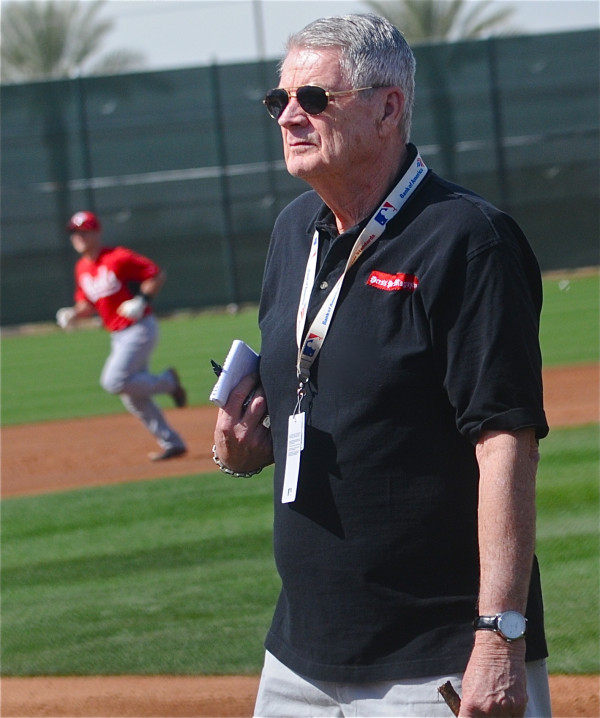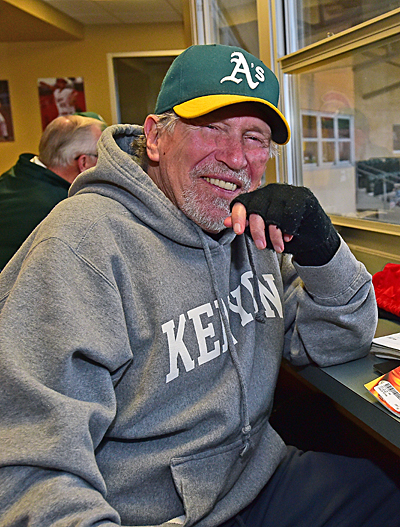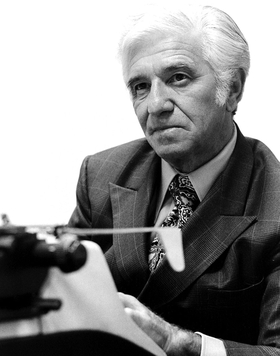
“It’s easy to write baseball, just a little awkward when you’re covering a losing streak.” – Jerome Holtzman, Chicago Tribune Hall of Famer (Press Pros File Photos)
In Florida with warm clear skies, and the opportunity to write about something that nearly writes itself. Some words on why writers choose to write about baseball over other sports.
 Port Charlotte, FL – This column began with a visit and dinner recently with a friend in Indianapolis. Mike Fitzpatrick and I have known each since the early days of free-lancing NBA basketball at now-demolished Market Square Arena, hoping to sell a few pictures to magazine publishers in order to justify an expensive photo hobby.
Port Charlotte, FL – This column began with a visit and dinner recently with a friend in Indianapolis. Mike Fitzpatrick and I have known each since the early days of free-lancing NBA basketball at now-demolished Market Square Arena, hoping to sell a few pictures to magazine publishers in order to justify an expensive photo hobby.
He asked me, “Why, if you could write about Ohio State football, do you choose to write about Ohio State baseball, instead? You own the website (Press Pros), so why do you write about baseball instead of the biggest thing on campus?”

Press Pros editor and publisher Sonny Fulks writes Buckeyes baseball for Press Pros Magazine.
I explained, best I could, over a bowl of St. Elmo’s bean soup.
I shared a number of reasons why baseball, to me, was preferable – yes, preferable – to writing about football or basketball. Mainly, there’s always been a long list of sports scribes who have chosen baseball with priority, because of the sport’s popularity at the turn of the 20th century.
Humorist Will Rogers once said this about baseball’s appeal: “In Biblical times there was a 13th disciple that you never heard about. Why? He chose to cover the (World) Series over the sermon on the mount.”
 Fitzpatrick was never one to pursue something whimsical. Soon after he quit free-lancing, he began selling commercial real estate, and retired having made a fortune. I went another direction, in photo retail, later in broadcast journalism and sales, before starting Press Pros Magazine in 2010. For old times’ sake, I congratulated him on his success, and presented him with the check.
Fitzpatrick was never one to pursue something whimsical. Soon after he quit free-lancing, he began selling commercial real estate, and retired having made a fortune. I went another direction, in photo retail, later in broadcast journalism and sales, before starting Press Pros Magazine in 2010. For old times’ sake, I congratulated him on his success, and presented him with the check.
But his question about writing baseball is a wonderful topic for a column – about the thousands of masterful baseball stories from notables that I grew up, and grew old, reading.
There was Earl Lawson (Cincinnati Enquirer), Hal McCoy (Dayton Daily News), Dick Young (New York Daily News), Joe Falls (Detroit Free Press) and Furman Bisher (Atlanta Constitution). I read those guys every week from a $3 annual subscription to the The Sporting News. They were all contributing writers, and that subscription was about all I ever asked for at Christmas.

“I’ve done it for fifty years and I’d still go to the ballpark three hours before the game if I were doing it today just so I could observe, talk about baseball, and pick up a few nuggets along the way.” – Cooperstown enshrinee, Hal McCoy
I’ve been fortunate over the years to meet, and work with some of them. Hal McCoy is ‘currently’ a Press Pros contributor. And almost all of them come from the same beginning – a love for the game, and a desire to learn something new by observing it every day.
“I just grew up loving baseball,” said Hal recently. “My dad came back from the war when I was 5 years old, he’d play catch with me in the backyard, and baseball just grew on me. And when I was a student at Kent State and had to choose a career path in journalism, I naturally had an instinct to write about baseball. I’ve done it for fifty years and I’d still go to the ballpark three hours before the game if I were doing it today just so I could observe, talk about baseball, and pick up a few nuggets along the way.”
I’m not the first to have said this, but to Fitzpatrick’s question of why baseball, I will share this. That baseball is not only a natural sport to cover…but rather, it’s the easiest sport to write the truth about while you’re covering it. Baseball, I explained to him, nearly writes itself.

“It’s harsh sometimes. But baseball is so human. It’s so obvious. There’s nothing you don’t understand. You’re either safe, or out…you catch it or you don’t.” – Press Pros contributor, Greg Hoard
Football is more complex, with more people…22 on the field at a time. It’s a sport with an overtone of size and physical dominance, a totally different personality. By comparison, size doesn’t matter in baseball and a player’s skills are like a command performance, always in full view of those who watch. If Johnny makes an error he makes an error. If Johnny strikes out, it’s simple. He struck out. There’s no one that missed a block that caused him to strike out. No, Johnny just struck out.
A couple of years ago Buckeye pitcher Seth Lonsway beat Indiana in the first game of a 7-inning double-header, and struck out 17 hitters doing it – 17 of 21 outs! Indiana didn’t have a chance. Lonsway was unhitable. That’s what I wrote. It was exciting to watch – compelling, and everyone watching understood. There was no 2-3 zone, or two-deep zone to comprehend as we watched. Seth Lonsway, plain and simple, just stuck it up their backsides. And that’s what you write, refreshing in its simplicity, inarguable by anyone challenged to accept the truth.
“It’s harsh sometimes,” says former Reds writer Greg Hoard. “But baseball is so human. It’s so obvious. There’s nothing you don’t understand. You’re either safe, or out…you catch it or you don’t. The game writes itself.”

The McKinley Funeral Home of Lucasville, Ohio, proudly supports Ohio State baseball on Press Pros.
These are the qualities about baseball that imprinted me from an early age…from reading all the above-mentioned in the weekly Sporting News, and the yearly baseball bible, Streets and Smith. You can’t be a politician and write about baseball. You can’t lie. Everybody sees the same thing you see, and if you don’t write the truth you have no credibility.
Opinions? Yes. People can disagree all they want with how you write the truth, but in the end they can’t complain about the box score, which someone once described as “the obituary of a losing team.”
Chicago Tribune beat writer Jerome Holtzman once wrote “that it’s easy to write baseball, just a little awkward when you’re covering a losing streak.”
It’s inarguable, out in the open, and so easy to understand.

“You don’t need quotes. Baseball is that self-explanatory.” – Dick Young, New York Daily News
“You don’t need quotes,” wrote New York Daily News writer Dick Young, “Baseball is that self-explanatory.” Yankee owner George Steinbrenner once called Young, “A jewel.”
It’s still special – the first strikeout, home run, and I dare say Bill Mosiello’s first win as coach of the Buckeyes. They’re all the same, in the same manner that they’re all unique.
I write baseball because I know back in Columbus Ohio State sports information director Jerry Emig is reading…that Buckeye broadcasters Matt Andrews and Bob Spears are reading. Not because it’s Ohio State, but because it’s baseball. Emig actually carries a Harmon Killebrew baseball card in his wallet. That’s what it can do to you.
So I’m the only guy covering the Buckeyes this week, enjoying 80-degree days while watching, loving…and still learning. Mike Fitzpatrick doesn’t get it.
A last quote: Former Yankee pitcher Jim Bouton wrote before he died: “You spend your whole life gripping a baseball, only to learn that in the end it’s baseball that’s got a grip on you.”
Exactly.


